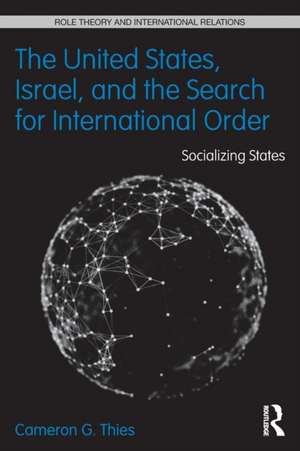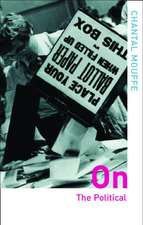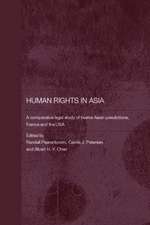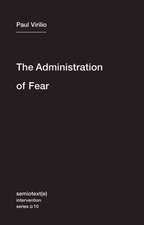The United States, Israel, and the Search for International Order: Socializing States: Role Theory and International Relations
Autor Cameron G. Thiesen Limba Engleză Paperback – 16 dec 2014
Thies develops a theoretical approach to understanding how states socialize each other into and out of different roles in the international system, such as regional power, ally, and peacekeeper. The concept of state socialization is developed using role theory, a middle-range theory developed in the interdisciplinary field of social psychology. This middle-range theory helps to flesh out the theoretical mechanisms often missing in grand theories like neorealism and constructivism. The result is a structural theory of international politics that also allows for the explanation of actual foreign policy behavior by states. The foreign policy histories of the U.S. and Israel are analyzed using this theoretical approach to show how international social pressure has affected the kinds of roles they have adopted throughout their histories, as well as the kinds of roles that they have not been allowed to adopt. By considering the effects of international socialization attempts on their foreign policy behavior, Thies shows the well-known cases of the U.S. and Israel in a new light.
The United States, Israel and the Search for International Order argues that the process by which states learn their appropriate roles and behaviors in the international social order is crucial to understanding international conflict and cooperation, which will be significant for those studying both theory and method in international relations, foreign policy, and diplomatic history.
| Toate formatele și edițiile | Preț | Express |
|---|---|---|
| Paperback (1) | 408.38 lei 6-8 săpt. | |
| Taylor & Francis – 16 dec 2014 | 408.38 lei 6-8 săpt. | |
| Hardback (1) | 1057.05 lei 6-8 săpt. | |
| Taylor & Francis – 15 mai 2013 | 1057.05 lei 6-8 săpt. |
Din seria Role Theory and International Relations
-
 Preț: 310.08 lei
Preț: 310.08 lei -
 Preț: 311.41 lei
Preț: 311.41 lei -
 Preț: 453.27 lei
Preț: 453.27 lei -
 Preț: 404.11 lei
Preț: 404.11 lei -
 Preț: 383.89 lei
Preț: 383.89 lei -
 Preț: 386.51 lei
Preț: 386.51 lei -
 Preț: 411.42 lei
Preț: 411.42 lei - 16%
 Preț: 298.58 lei
Preț: 298.58 lei -
 Preț: 317.01 lei
Preț: 317.01 lei - 19%
 Preț: 242.79 lei
Preț: 242.79 lei -
 Preț: 378.71 lei
Preț: 378.71 lei -
 Preț: 385.71 lei
Preț: 385.71 lei -
 Preț: 389.66 lei
Preț: 389.66 lei -
 Preț: 381.98 lei
Preț: 381.98 lei -
 Preț: 389.66 lei
Preț: 389.66 lei - 20%
 Preț: 259.98 lei
Preț: 259.98 lei - 18%
 Preț: 1001.87 lei
Preț: 1001.87 lei - 9%
 Preț: 935.77 lei
Preț: 935.77 lei
Preț: 408.38 lei
Nou
Puncte Express: 613
Preț estimativ în valută:
78.14€ • 81.76$ • 64.91£
78.14€ • 81.76$ • 64.91£
Carte tipărită la comandă
Livrare economică 03-17 aprilie
Preluare comenzi: 021 569.72.76
Specificații
ISBN-13: 9780415832939
ISBN-10: 0415832934
Pagini: 196
Dimensiuni: 152 x 229 x 23 mm
Greutate: 0.27 kg
Ediția:1
Editura: Taylor & Francis
Colecția Routledge
Seria Role Theory and International Relations
Locul publicării:Oxford, United Kingdom
ISBN-10: 0415832934
Pagini: 196
Dimensiuni: 152 x 229 x 23 mm
Greutate: 0.27 kg
Ediția:1
Editura: Taylor & Francis
Colecția Routledge
Seria Role Theory and International Relations
Locul publicării:Oxford, United Kingdom
Public țintă
PostgraduateCuprins
1. Improving Structural Theories of International Politics 2. Socializing States in the International System 3. Socializing the United States: Emergence to Major Member 4. Socializing the Unites States: Structural Imperatives and Great Power Status 5. Socializing Israel: Emergence to Major Member 6. Conclusion
Notă biografică
Cameron G. Thies is Professor, Harlan E. McGregor Faculty Fellow, and Chair of the Department of Political Science at the University of Iowa. His research focuses on International Relations theory through the contributions of role theory, as well as state building in the developing world. He has published widely in journals such as World Politics, European Journal of International Relations, British Journal of Political Science, and International Studies Quarterly.
Recenzii
"The core contribution of Cameron Thies’ inaugural book in Routledge’s new series on role theory and foreign policy is the notion of "state socialization." Embedded in the language of role theory, the concept explains how international system structure emerges as a result of the socializing interactions among the units. Importantly, the concept of state socialization allows Thies to account for both continuity and change in the international system. In doing so, Thies’ book offers a solidly constructed bridge between agent and structure in international politics."
—Marijke Breuning, University of North Texas
"The United States, Israel and the Search for International Order is the best monograph on role theory in recent years. Thies provides an intriguing and elegant model that accounts for state socialization using role theory. Going beyond disciplinary and epistemological boundaries, this book establishes a theoretically sophisticated but concise argument for role behavior by established and novice states. It exposes unexpected commonalities of role bearing states in different international orders and introduces convincing causal mechanisms to explain them. This is a signal contribution to role scholarship in IR and Foreign Policy Analysis."
—Sebastian Harnisch, University of Heidelberg
"The core contribution of Cameron Thies’ inaugural book in Routledge’s new series on role theory and foreign policy is the notion of "state socialization." Embedded in the language of role theory, the concept explains how international system structure emerges as a result of the socializing interactions among the units. Importantly, the concept of state socialization allows Thies to account for both continuity and change in the international system. In doing so, Thies’ book offers a solidly constructed bridge between agent and structure in international politics."
—Marijke Breuning, University of North Texas
"The United States, Israel and the Search for International Order is the best monograph on role theory in recent years. Thies provides an intriguing and elegant model that accounts for state socialization using role theory. Going beyond disciplinary and epistemological boundaries, this book establishes a theoretically sophisticated but concise argument for role behavior by established and novice states. It exposes unexpected commonalities of role bearing states in different international orders and introduces convincing causal mechanisms to explain them. This is a signal contribution to role scholarship in IR and Foreign Policy Analysis."
—Sebastian Harnisch, University of Heidelberg
"The book succeeds admirably in its primary aim of opening up the 'black box' of the socialization process and how it operates for states adopting different roles. At a time of intense debate about which states are or should be conferred with Great Power rights and responsibilities, and when phrases such as 'the hegemon', 'rising powers' and 'Southern powers' are commonplace public debate, this book is a timely and important contribution to our understanding of role theory in IR."
- Benjamin Zala, University of Leicester
—Marijke Breuning, University of North Texas
"The United States, Israel and the Search for International Order is the best monograph on role theory in recent years. Thies provides an intriguing and elegant model that accounts for state socialization using role theory. Going beyond disciplinary and epistemological boundaries, this book establishes a theoretically sophisticated but concise argument for role behavior by established and novice states. It exposes unexpected commonalities of role bearing states in different international orders and introduces convincing causal mechanisms to explain them. This is a signal contribution to role scholarship in IR and Foreign Policy Analysis."
—Sebastian Harnisch, University of Heidelberg
"The core contribution of Cameron Thies’ inaugural book in Routledge’s new series on role theory and foreign policy is the notion of "state socialization." Embedded in the language of role theory, the concept explains how international system structure emerges as a result of the socializing interactions among the units. Importantly, the concept of state socialization allows Thies to account for both continuity and change in the international system. In doing so, Thies’ book offers a solidly constructed bridge between agent and structure in international politics."
—Marijke Breuning, University of North Texas
"The United States, Israel and the Search for International Order is the best monograph on role theory in recent years. Thies provides an intriguing and elegant model that accounts for state socialization using role theory. Going beyond disciplinary and epistemological boundaries, this book establishes a theoretically sophisticated but concise argument for role behavior by established and novice states. It exposes unexpected commonalities of role bearing states in different international orders and introduces convincing causal mechanisms to explain them. This is a signal contribution to role scholarship in IR and Foreign Policy Analysis."
—Sebastian Harnisch, University of Heidelberg
"The book succeeds admirably in its primary aim of opening up the 'black box' of the socialization process and how it operates for states adopting different roles. At a time of intense debate about which states are or should be conferred with Great Power rights and responsibilities, and when phrases such as 'the hegemon', 'rising powers' and 'Southern powers' are commonplace public debate, this book is a timely and important contribution to our understanding of role theory in IR."
- Benjamin Zala, University of Leicester
Descriere
How do emerging states become full, functioning members of the international system? Cameron G. Thies develops a theoretical approach to understanding how states socialize each other into and out of different roles in the international system, such as regional power, ally, and peacekeeper. The concept of state socialization is developed using role theory, a middle-range theory developed in the interdisciplinary field of social psychology. The foreign policy histories of the U.S. and Israel are analyzed using this theoretical approach to show how international social pressure has affected the kinds of roles they have adopted throughout their histories, as well as the kinds of roles that they have not been allowed to adopt. By considering the effects of international socialization attempts on their foreign policy behavior, Thies shows the well-known cases of the U.S. and Israel in a new light.














